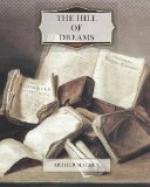take the great deep, and float away from the mist
and dust of earthly streets to anchor in the haven
of the clear city that hath foundations. The rank
tale of the
garderobe, of the farm-kitchen,
mingled with the reasoned, endless legend of the schools,
with luminous Platonic argument; the old pomp of the
Middle Ages put on the robe of a fresh life. There
was a smell of wine and of incense, of June meadows
and of ancient books, and through it all he hearkened,
intent, to the exultation of chiming bells ringing
for a new feast in a new land. He would cover
pages with the analysis of these marvels, tracking
the suggestion concealed beneath the words, and yet
glowing like the golden threads in a robe of samite,
or like that device of the old binders by which a
vivid picture appeared on the shut edges of a book.
He tried to imitate this art, to summon even the faint
shadow of the great effect, rewriting a page of Hawthorne,
experimenting and changing an epithet here and there,
noting how sometimes the alteration of a trifling
word would plunge a whole scene into darkness, as
if one of those blood-red fires had instantly been
extinguished. Sometimes, for severe practice,
he attempted to construct short tales in the manner
of this or that master. He sighed over these desperate
attempts, over the clattering pieces of mechanism which
would not even simulate life; but he urged himself
to an infinite perseverance. Through the white
hours he worked on amidst the heap and litter of papers;
books and manuscripts overflowed from the bureau to
the floor; and if he looked out he saw the mist still
pass by, still passing from the river to the north.
It was not till the winter was well advanced that
he began at all to explore the region in which he
lived. Soon after his arrival in the grey street
he had taken one or two vague walks, hardly noticing
where he went or what he saw; but for all the summer
he had shut himself in his room, beholding nothing
but the form and color of words. For his morning
walk he almost invariably chose the one direction,
going along the Uxbridge Road towards Notting Hill,
and returning by the same monotonous thoroughfare.
Now, however, when the new year was beginning its dull
days, he began to diverge occasionally to right and
left, sometimes eating his luncheon in odd corners,
in the bulging parlors of eighteenth-century taverns,
that still fronted the surging sea of modern streets,
or perhaps in brand new “publics” on the
broken borders of the brickfields, smelling of the
clay from which they had swollen. He found waste
by-places behind railway embankments where he could
smoke his pipe sheltered from the wind; sometimes
there was a wooden fence by an old pear-orchard where
he sat and gazed at the wet desolation of the market-gardens,
munching a few currant biscuits by way of dinner.
As he went farther afield a sense of immensity slowly
grew upon him; it was as if, from the little island
of his room, that one friendly place, he pushed out
into the grey unknown, into a city that for him was
uninhabited as the desert.




